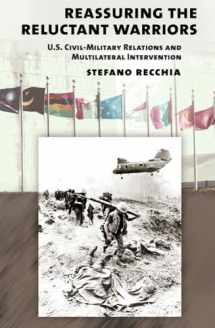
Reassuring the Reluctant Warriors: U.S. Civil-Military Relations and Multilateral Intervention (Cornell Studies in Security Affairs)
Book details
Summary
Description
Why did American leaders work hard to secure multilateral approval from the United Nations or NATO for military interventions in Haiti, the Balkans, and Libya, while making only limited efforts to gain such approval for the 2003 Iraq War? In Reassuring the Reluctant Warriors, Stefano Recchia addresses this important question by drawing on declassified documents and about one hundred interviews with civilian and military leaders.
The most assertive, hawkish, and influential civilian leaders, he argues, tend to downplay the costs of intervention, and when confronted with hesitant international partners they often want to bypass multilateral bodies. America's top-level generals, by contrast, are usually "reluctant warriors" who worry that intervention will result in open-ended stabilization missions; consequently, the military craves international burden sharing and values the potential exit ramp for U.S. forces that a handoff to the UN or NATO can provide.
Recchia demonstrates that when the military speaks up and clearly expresses its concerns, even strongly pro-intervention civilian leaders can be expected to work hard to secure UN or NATO approval--if only to reassure the military about the likelihood of sustained burden sharing. Conversely, when the military stays silent, as it did in the run-up to the 2003 Iraq War, bellicose civilian leaders are empowered; the United States is then more likely to bypass multilateral bodies, and it may end up carrying a heavy stabilization burden largely by itself. Recchia's argument that the military has the ability to contribute not only to a more prudent but also to a more multilateralist U.S. intervention policy may be counterintuitive, but the evidence is compelling.


We would LOVE it if you could help us and other readers by reviewing the book
Book review



